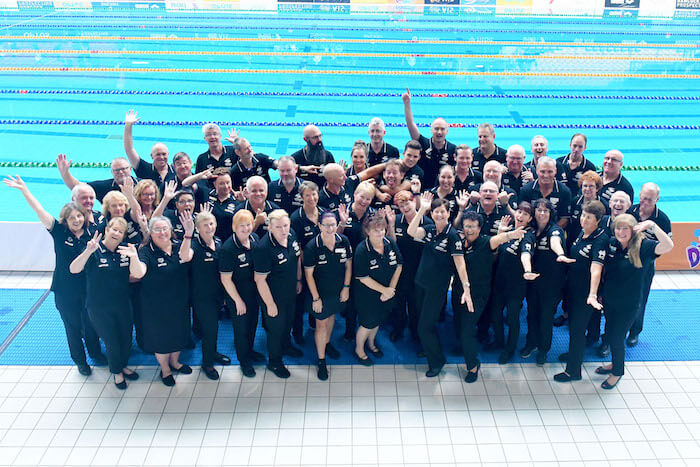
I knew immediately that it wasn’t a correct breast stroke turn.
I’d been inspecting turns for the previous 4 hours on lane 9. About twice per minute a swimmer would approach, turn, and depart. And with every turn the moisture content of my trousers, socks and shoes would increase.
Although I didn’t know it at the time, my ‘Turn Inspecting’ career probably started about a decade earlier when my daughters discovered the sport of swimming. I had never aspired to become a swimming technical official, infact for several years I had actively avoided it. But here I was officiating at the Georgia Hope Foundation Australian Age Swimming Championships for the very first time.
Approach, turn, splash.
Officiating at this meet was a little different from others that I have attended. In the spirit of offering helpful advice to future newbies, here are some tips:
- Look after yourself: 8 days straight officiating morning and evening is a MASSIVE commitment. Maintaining focus, endurance, health and positivity over the entire week requires special attention. Try to get enough sleep and maintain a good diet and personal hygiene. An outbreak of gastro during the week sidelined a number of my colleagues so the rest of us were regularly using hand santizer. Personally I enjoyed a couple of lunchtime swims to rejuvenate the body.
- Take food and water onto the pool deck: unlike most other meets, nobody will bring you anything, so BYO! Note that reserve TOs will come round occasionally so you can swap out to take a short break.
- Embrace the striving for perfection but don’t fear it: Nationals is a big deal and the organisers rightly strive for perfection. Some protocols may be different from those that you are used to, so pay attention during the briefings. Overall, if you have been trained well then relax, enjoy, do your job and you’ll be fine. If you do stuff up, it will be noticed, but don’t worry and move on – just don’t make the same mistake again!
- Rehearse the details: make sure you know all the protocols for your roles. If you are a reserve then you’ll need to know them for most roles. As a JOS or IOT know when to stand, sit, where to position yourself relative to the overhead cameras, how to make reports, etc. Check Starters need to know the procedure for walking on and off including timing, positioning and only ever having one heat on deck at a time. Clerks of Course should be familiar with the withdrawal procedure, and reporting for 800 and 1500 events. Finals sessions run slightly different from Heats so stay focussed. Familiarise yourself with the SAL preferred ways of writing infractions. You are given one program for the entire week which most people separate and re-bind into individual sessions.
- Enjoy the diversity: you will be working alongside officials from all over Australia – enjoy the experience! In a team that size you probably won’t get along with everybody, but you can respect and learn from all. On a couple of occasions I found myself becoming a bit ‘prickly’ with some people, but in retrospect I was the one who needed to adjust my attitude.
- Live the culture: it says #ourteam on the back of our shirts, and it’s more than a slogan. Apparently in the past there has been quite a toxic culture on the pool deck. It is to SAL’s credit that so much has been done to clean this up. There is a pecking order, people are ambitious to get the ‘best’ jobs and officials do have a habit of critiquing each others work a bit like drivers complaining about other road users. Most people seem to know where to draw the line because and I genuinely felt that everyone had everyone else’s back.
Approach, turn, splash.
And as for that incorrect breast stroke turn, I was just about to make a report when I realised that it was in fact a freestyle event! Several days and hours into the meet, I’d simply lost focus!
Photo courtesy of Swimming Australia